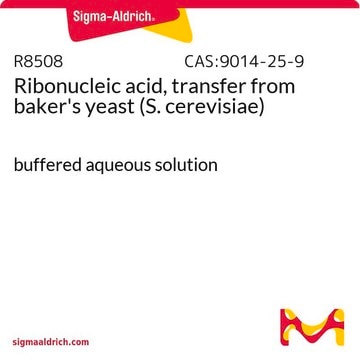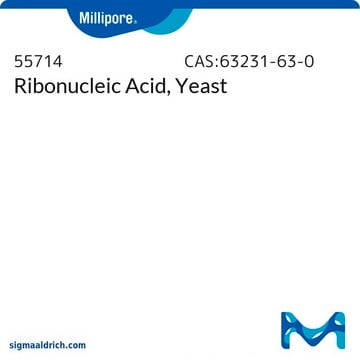R5636
Ribonucleic acid, transfer from baker′s yeast (S. cerevisiae)
buffered aqueous solution
Sinónimos:
Transfer RNA, tRNA
Iniciar sesiónpara Ver la Fijación de precios por contrato y de la organización
About This Item
Productos recomendados
grade
for molecular biology
Quality Level
form
buffered aqueous solution
concentration
≥9 mg/mL
foreign activity
DNase, Nickase, none detected
shipped in
dry ice
storage temp.
−20°C
¿Está buscando productos similares? Visita Guía de comparación de productos
General description
Transfer RNA (tRNA) is isolated from baker′s yeast by phenol-chloroform extraction and ethanol precipitation. tRNAs are approximately 80 nucleotides long RNA molecules with a cloverleaf shaped secondary structure and a tertiary L-shaped structure.
Application
Suitable for use as a carrier in nucleic acid purification and precipitation.
Ribonucleic acid, transfer from baker′s yeast (S. cerevisiae) has been used:
Ribonucleic acid, transfer from baker′s yeast (S. cerevisiae) has been used:
- in carrier solution as a part of control used for reverse transcriptase – quantitative polymerase reaction (RT-qPCR) assay
- as a component of prehybridization(4) and hybridization buffer in single-label in situ hybridization
- as a carrier to enhance recovery of RNA from small numbers of cells
Biochem/physiol Actions
Transfer RNAs (tRNAs) play an important role in translation. It is responsible for the addition of amino acids to ribosome for peptide chain formation. The tRNA contains an anticodon region for mRNA base pairing and two attachment regions: for amino acid binding and tRNA synthetase recognition. The ribosomal RNA facilitates the movement of tRNA along the mRNA.
Components
tRNA is provided in a solution in 10 mM Tris HCl (pH 7.4) in 1 mM EDTA.
related product
Referencia del producto
Descripción
Precios
Certificados de análisis (COA)
Busque Certificados de análisis (COA) introduciendo el número de lote del producto. Los números de lote se encuentran en la etiqueta del producto después de las palabras «Lot» o «Batch»
¿Ya tiene este producto?
Encuentre la documentación para los productos que ha comprado recientemente en la Biblioteca de documentos.
Los clientes también vieron
Oliver Mühlemann et al.
Methods in molecular medicine, 131, 33-46 (2007-07-28)
Here we describe a collection of methods that have been adapted to produce highly efficient nuclear and cytoplasmic extracts from adenovirus-infected HeLa cells. We describe how to produce extracts from virus-infected cells and how to analyze RNA splicing in vitro
Marilyn C Olson et al.
Methods in molecular biology (Clifton, N.J.), 258, 53-69 (2004-02-19)
The Invader assay is a homogeneous, isothermal, signal amplification system for the quantitative detection of nucleic acids. The assay can directly detect either DNA or RNA without target amplification or reverse transcription. It is based on the ability of Cleavase
Naming 'junk': human non-protein coding RNA (ncRNA) gene nomenclature
Wright MW and Bruford EA
Human Genomics, 5(2), 90-90 (2011)
Eric A Nalefski et al.
iScience, 24(9), 102996-102996 (2021-09-11)
Bacterial CRISPR systems provide acquired immunity against invading nucleic acids by activating RNA-programmable RNases and DNases. Cas13a and Cas12a enzymes bound to CRISPR RNA (crRNA) recognize specific nucleic acid targets, initiating cleavage of the targets as well as non-target (trans)
Quantitative Analysis of T Cell Receptor Diversity in Clinical Samples of Human Peripheral Blood
Memon SA, et al.
Journal of Immunological Methods, 375(1-2), 84?92-84?92 (2012)
Nuestro equipo de científicos tiene experiencia en todas las áreas de investigación: Ciencias de la vida, Ciencia de los materiales, Síntesis química, Cromatografía, Analítica y muchas otras.
Póngase en contacto con el Servicio técnico








